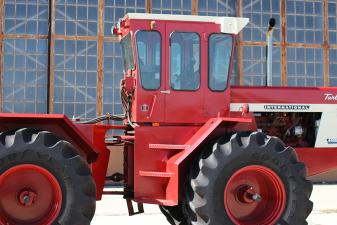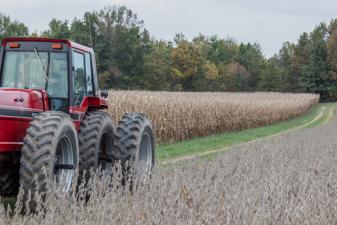Chapter Three: Dad

The following is excerpted material from Stories from the Heartland, written by "Farm Progress America" radio broadcaster, Max Armstrong. That book is out of print.
Armstrong's 40 year career in radio broadcasting began as a young boy, when he strung an antenna wire from his bedroom window to a pole behind the chicken coop in the backyard. He was only 11 years old and his signal only covered a quarter-mile, but his career had just begun. In this passage, Armstrong pays dues to his parents, owners of Jim and Stella Fay Armstrong's Corn and Soybean Farm in Indiana's Wabash River Valley, who's hard work, sacrifice, and love made him who he is today: America's favorite farm broadcaster.
My dad was part of the “Greatest Generation,” a description I believe Tom Brokaw is credited with, and I can’t think of a better term to describe and honor those folks. In my case, and I know this to be true for many other people of my generation, the hardships and sacrifices made by our parents — unimaginable by today’s standards — made all of the gains made by the Baby Boomer generation possible. . . .
He was a very caring father and was concerned about our futures. Dad told us that farming is difficult and challenging in many different ways, and he encouraged us to broaden our horizons. “Keep your options open,” he said. Farming had been good for our family, but, “take a look at all the opportunities out there.” We did, and neither one of us wound up farming for a living. Steve is retired from the food industry where he was a vice-president of Human Resources for a large national brand. Today, he is a personal financial advisor, and has looked after his little brother much longer than he was obligated to. Both of us were fortunate enough to go to Purdue. We had minor scholarships that, even back then, didn’t add up to much. Dad and Mom came up with the rest.
Sometimes when I’m on Dad’s old “Super H,” I think of those family tractors we love to collect, restore and admire, and how they aren’t just hunks of iron. Those tractors enabled our parents to put a roof over our heads, feed and clothe us, and also to give many of us an opportunity to go away to college.
Like many Midwesterners, Mom and Dad really enjoyed listening to WGN. It was 300 miles away and the signal could be a little scratchy during the day, but thanks to the sky wave — the skip — WGN came in loud and clear after dark when atmospheric conditions were right. When I went to work with Orion in the late ’70s and was doing a lot of TV, Mom and Dad wanted to be able to see their son on WGN-TV, but Channel 9’s signal didn’t reach that far. This was long before satellite dishes came along. Cable TV had just come to Owensville, but our farm wasn’t in the town limits. So Mom and Dad went before the town board and asked if they could get cable run the quarter of a mile out to the farm, and the board said, yes, it could do that, if the farmhouse was in the town limits. Owensville annexed the farmhouse, not the rest of the farm, because Mom and Dad wanted to be able to see me on WGN-TV!
--------------------

Left: Jim and Stella Fay Armstrong. Max Armstrong
Right: This photo of me as a teenager brings back memories of long, hot days guiding the "Super M" around the Wabash Bottoms. But as the sizzling sun (that had tortured me all day) settled behind the tree line, it was time to head to the house. There just were not many things that felt better than pulling the implement out of the ground, easing the tractor out onto the blacktop, and shifting into "road gear." Heading up the road at a blazing 15 miles per hour with the blast of cool evening air taking some of the sunburn sting away, it felt so good to have done a day's work. All these years later, hardly anything has ever looked as pretty as coming around the curve down by the barn and catching the first glimpse of the warm, yellow glow in the darkness from Mom's kitchen window and knowing what was soon to be on my plate. Max Armstrong

Left: Jim Armstrong on his 1953 Farmall "Super H." This was the winter of 1986–87 at our Owensville, Indiana, farm. He would have been 70, and this was about eight years before the "Super H" moved to Illinois and got a facelift. Max Armstrong
Right: Three Generations of Armstrongs: Dad, Kristi, and me. Max Armstrong

Jim Armstrong on the "Super H" before it was restored. Max Armstrong






